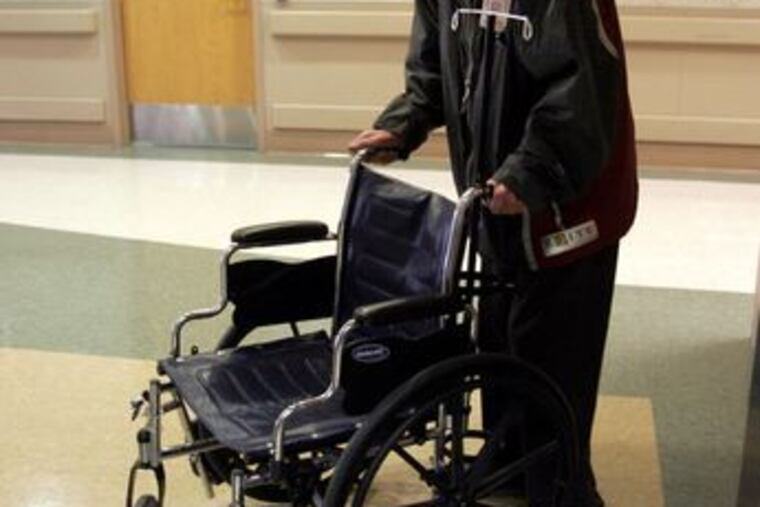Back Channels: By helping homeless vets, she fits in again
Retired Gen. Eric Shinseki will have his share of headaches when he becomes secretary of veterans affairs next year. But he won't serve alone. There are plenty of good people in his agency and related programs who are ready to help.

Retired Gen. Eric Shinseki will have his share of headaches when he becomes secretary of veterans affairs next year. But he won't serve alone. There are plenty of good people in his agency and related programs who are ready to help.
One of them is Marsha Four, a Vietnam veteran who found her place 10 years ago when she became director of homeless services for the Philadelphia Veterans Multiservice and Education Center.
"I was looking for a while to where I fit," Four said. "Connecting myself to other vets brought a fullness to my life, and actually made me very proud to be a woman vet."
Four understands the difficulty of transitioning from a war zone to civilian life. She volunteered while still in nursing school and was sent to Vietnam not long after graduation.
She was in country during 1969-70, one of about 15 nurses with the 18th Surgical Hospital near the DMZ. It was an intense environment that treated wounded soldiers taken right off the battlefield. Those who survived their injuries were usually shipped to bigger hospitals within 48 hours. Many did not survive.
"You become an adrenaline junkie in a way," Four said. "There, everything was bang, bang, bang."
Like most others, Four was counting the days until she could leave. But it was hard to think about going home. Even harder to imagine what would come next.
"Vietnam could be this very lonely place, while at the same time you had this tremendous bond with those you served with," Four said. "One of the hardest days was leaving them. . . . They helped me make it through the toughest and most significant year of my life."
Just as difficult was saying goodbye to the work.
"You're there for a year, and you're really good at your business," Four remembered. "Then there's this emptiness. Who am I going to be when I leave here? . . . We felt sort of lost when we came home."
A lack of appreciation for her skills didn't help. After the war, while working in a New York hospital, she says she wasn't even allowed to hang a unit of blood. A doctor had to do it.
"Some women left nursing altogether because they thought their abilities, their experiences, spoke for nothing," Four said. "We were lost in the health field because there was no challenge, no excitement. Something was missing for us."
Four continued nursing, but she remained adrift in some ways until 1987, when she walked into a meeting of a local chapter of the Vietnam Veterans of America.
"It was very cathartic," Four recalled. "They gave you a sense of belonging, a sense that everybody understood what you were talking about. They had the same memories of time and place and smell. I really felt at home there with them."
It wasn't long before she connected her medical skills with volunteer efforts to help veterans, especially homeless vets, which eventually led to her current job.
Four has charge of a number of programs, including:
The Perimeter, a day service in Philadelphia, which provides the basics - showers and meals - as well as help with financial planning, job placement and Veterans Administration claims.
LZII, a 95-bed facility at the Coatesville VA Medical Center, that helps with recovery, treatment, education and employment. Vets can be in residence for up to two years.
Walker House, a 30-bed women's vets facility in Coatesville.
It's often difficult for vets who have hit bottom to commit to the rules and structure of a residential program. But by the time they get to Four, there is usually nowhere else to turn.
"Most of them see this as the safe refuge they've been looking for for a very long time," Four said. "Anyone who has seen the dark side can know how hopeless that can feel, how terrifying it can be to be alone in that situation."
Four said she believed the country was going to have to devote more resources to women vets, including health-care studies and sexual-trauma and residential therapy programs.
Most of the women who have stayed at Walker House served during peacetime, with about a quarter from the first Gulf War. But vets from Afghanistan and Iraq are going to need help too.
"Women over there are much more connected to combat-type situations, infantry or not," Four said. "They're deployed, redeployed, separated from their family, their children. We send them home without the opportunity to take on their own issues and problems before being a mom again, and then yank them back again.
"It's gonna take a long time to get over this one."
One thing that will help is the public's support of the troops, Four said, something her generation of vets did not see.
"They may not want them to be over there," Four said, "but they are going to take care of them."
Four and her fellow vets are ready to help.